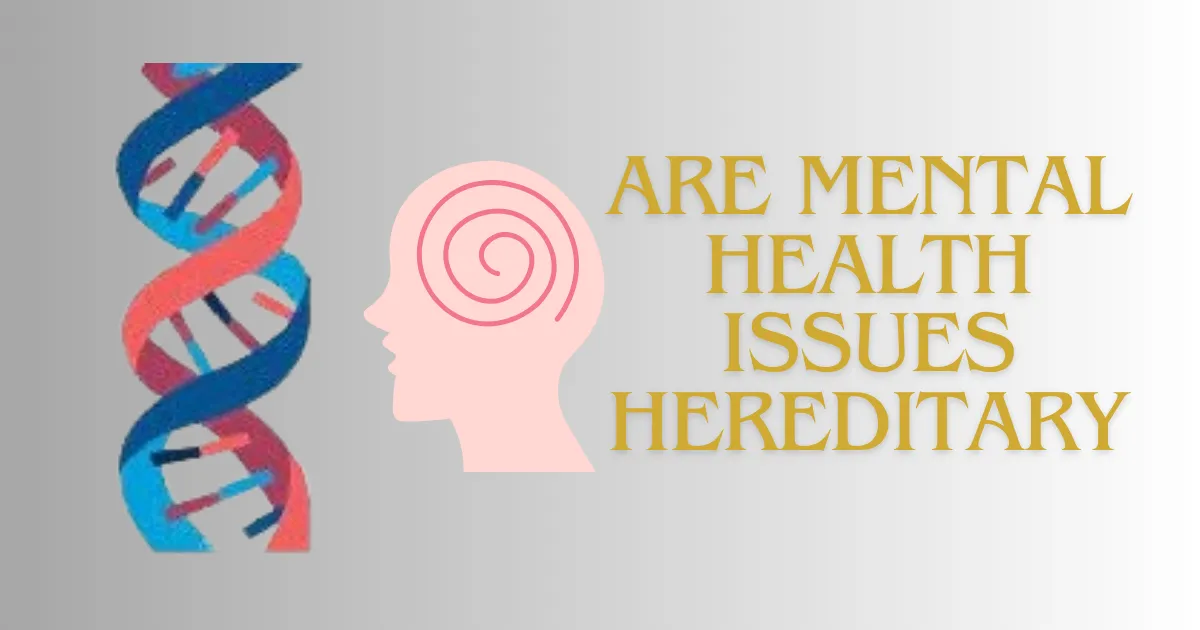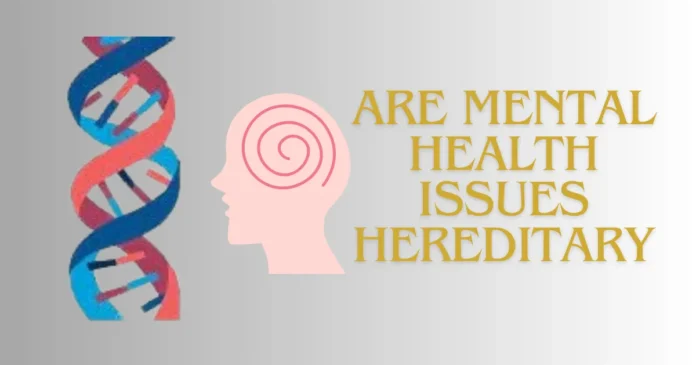Are Mental Health Issues Hereditary? Unraveling the Genetic Component
Mental health is a complex interplay of various factors, including genetics, environment, and individual experiences. Among these, the question of whether mental health issues are hereditary often arises. In this article, we’ll explore the relationship between genetics and mental health, delving into the latest research to uncover insights into this intriguing topic.

- When gathering a family medical history, some conditions are frequently mentioned.
- These conditions include coronary artery disease (CAD), cancer, and mental health issues.
- Reports of these conditions far exceed those of single-gene disorders like cystic fibrosis, sickle cell anemia, and hemochromatosis.
- Approximately 6.7% of adults aged 20 and older have coronary artery disease (CAD).
- More than 50% of individuals will experience a mental health issue at some point during their lifetime.
Understanding Hereditary Factors in Mental Health
What is heredity?
The term “heredity” describes the process by which genes transmit characteristics from one generation to the next. These genetic instructions play a significant role in determining various aspects of our physical and mental makeup, including susceptibility to certain health conditions.
The Role of Genetics in Mental Health
Research suggests that genetics can indeed influence the development of mental health disorders. Studies conducted on twins, for example, have shown that identical twins, who share 100% of their genetic makeup, are more likely to both develop certain mental health conditions compared to non-identical twins, who share only about 50% of their genes.
Common Mental Health Disorders with Genetic Links
Several mental health disorders have been associated with genetic factors, including:
- Depression: Studies have identified specific genes that may predispose individuals to depression, although environmental factors also play a significant role in its development.
- Anxiety Disorders: Genetic factors contribute to the risk of developing various anxiety disorders, such as generalized anxiety disorder (GAD), panic disorder, and social anxiety disorder.
- Bipolar Disorder: There is evidence to suggest a genetic component in bipolar disorder, with certain gene variations increasing susceptibility to this condition.
- Schizophrenia: While the exact genetic mechanisms underlying schizophrenia are complex and multifaceted, genetic predisposition is considered a significant factor in its development.
Complex Interplay of Genetics and Environment
It’s essential to recognize that mental health disorders are not solely determined by genetics. Environmental factors, such as childhood experiences, trauma, stress, and socio-economic status, also play a crucial role in shaping mental health outcomes. Moreover, gene-environment interactions can further complicate the picture, influencing how genetic predispositions manifest in real-life circumstances.
Challenges in Genetic Studies of Mental Health
Genetic Heterogeneity
Mental health disorders are characterized by genetic heterogeneity, meaning that multiple genes, each with small individual effects, may contribute to the risk of developing a disorder. Identifying these genetic variants and understanding their interactions poses significant challenges for researchers.
Gene-Environment Interactions
The interaction between genetic predispositions and environmental factors adds another layer of complexity to genetic studies of mental health. Factors such as childhood trauma, adverse life events, and social support can modify the expression of genes related to mental health, making it challenging to tease apart their individual contributions.
Conclusion: The Genetic Puzzle of Mental Health
While genetic factors undoubtedly play a role in the development of mental health disorders, the picture is far from straightforward. A person’s susceptibility to various conditions depends on a complex interplay of genetic, environmental, and individual factors that affect mental health. Understanding the genetic component of mental health can provide valuable insights for researchers and clinicians alike, paving the way for personalized approaches to prevention, diagnosis, and treatment.
In conclusion, while genetics may play a role, mental health issues are not solely genetic. Environmental factors, life experiences, and individual circumstances all play crucial roles in shaping mental health outcomes.
FAQs (Frequently Asked Questions)
Can mental health disorders skip generations?
While it’s possible for mental health disorders to run in families, they can also skip generations due to the complex interplay of genetic and environmental factors.
Are all mental health disorders hereditary?
No, not all mental health disorders have a clear hereditary component. Some may have stronger genetic links than others, and environmental factors also play a significant role.





Certainly! Here’s an extended version of the message:
thanks dear
“Hello there! I recently noticed that you’ve taken the time to visit my website, and I wanted to express my heartfelt gratitude for your interest. Your support means a lot to me. In return, I would like to extend my support by visiting your website as well.
thanks dear
What i dont understood is in reality how youre now not really a lot more smartlyfavored than you might be now Youre very intelligent You understand therefore significantly in terms of this topic produced me personally believe it from a lot of numerous angles Its like women and men are not interested except it is one thing to accomplish with Woman gaga Your own stuffs outstanding Always care for it up
thanks dear for comments
I simply could not go away your web site prior to suggesting that I really enjoyed the standard info a person supply on your guests Is going to be back incessantly to investigate crosscheck new posts
thanks dear